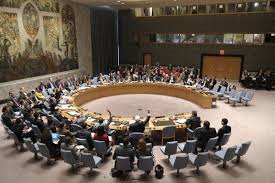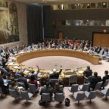
Russia Writes, US Approves UN Security Council Resolution on Ukraine
Publication: Eurasia Daily Monitor Volume: 12 Issue: 33
By:

On February 18–19, Ukraine decided to request the United Nations Security Council to authorize a peacekeeping contingent or police mission that would discourage further advances of Russian and proxy forces in Ukraine’s east (Ukrinform, February 18, 19). Debaltseve fell to Russian and proxy forces on February 18. Ukraine’s appeal, however, shattered on several obstacles, including the UN Security Council’s freshly adopted February 17 resolution. The resolution enshrines and legitimizes Russia’s gains at Ukraine’s expense in the Minsk agreements (see EDM, February 13, 19, 20).
Devalued as they generally are (politically, functionally and in other respects), UN Security Council Resolutions can sometimes provide interesting case studies of great-power understandings over issues affecting certain lesser third parties.
Such seems to be the case with the UN Security Council’s Resolution on Ukraine of February 17, 2015 (UNSC 2202). Russia, exceptionally in this case, initiated the resolution adoption process and submitted its own draft. According to Ukrainian government sources, the Barack Obama administration in Washington accepted Russia’s draft the next day, unchanged. Ukraine fell into line. That set the stage for the resolution to be adopted by the UN Security Council unanimously (Un.org, February 17).
The only change to the Russian draft came from Malaysia—namely, a reference within the preamble to the Security Council’s Resolution 2166 (2014) about criminal responsibilities for shooting down the Malaysian airlines Flight MH-17.
The western consensus around this resolution reflects the Obama administration’s and the German government’s decisions (each on its own account) to set clear limits to their political and other forms of engagement in the Russia-Ukraine crisis.
Lithuania and Ukraine found themselves alone in challenging the basic assumptions behind the proposed resolution during the UNSC debate. Lithuania upheld the right of any country to defend its territory militarily. Lithuania’s ambassador, Raimonda Murmokaite, termed Russia a direct participant in the conflict and condemned Russia’s arming of proxy forces against Ukraine. She pointed out that the secessionist forces are much better armed than the armies of many North Atlantic Treaty Organization (NATO) member countries. Inevitably, however, Ukraine and Lithuania followed the US lead to vote in favor of the proposed resolution.
The resolution’s preamble “reaffirms full respect for the sovereignty, independence and territorial integrity of Ukraine.” In the wake of Russia’s annexation of Crimea and seizure of territories in Ukraine’s east, that introductory profession is not simply a ritualistic one. Rather, it obscures the facts of the massive breach of that territorial integrity. The preamble further expresses “grave concern at the tragic events and violence in the eastern regions of Ukraine.” This implies that there is no aggression there, satisfying Russia’s insistence that those “events” are an internal Ukrainian conflict.
Further in the preamble, a solution “can only be achieved through a peaceful settlement,” code-word for the refusal to provide Ukraine with defensive weapons that could stop further Russian advances. Russia will henceforth be able to cite this US-endorsed resolution against proposals to arm Ukraine defensively. The “peaceful settlement” formula overlooks the actual military solution that Russia is imposing unilaterally.
The resolution’s point 1 endorses the February 12, 2015, Minsk Two agreement, titled “Package of Measures for the Implementation of the [September 2014] Minsk Agreements” (Minsk One). The UNSC resolution incorporates the Minsk Two document as an annex, thus conferring it further weight. This signifies an indirect endorsement of Minsk Two by the United States via the UNSC, although the US had declined to become tainted as a party to the February 12 agreement.
Contrary to the pretense of implementing the September 2014 Minsk One agreements, however, Minsk Two actually ratifies Russia’s multiple breaches of Minsk One on the military level; while on the political level it opens Russia’s entry into Ukraine’s constitutional processes (see EDM, February 13, 19, 20). The next day after the UNSC vote, Russia breached even the Minsk Two agreement by capturing Debaltseve with the use of overwhelming force.
The UNSC resolution’s point 2 welcomes the declaration signed on February 12 by German Chancellor Angela Merkel and Presidents Francois Hollande of France, Vladimir Putin of Russia, and Petro Poroshenko of Ukraine (see EDM, February 20). That declaration supports the Minsk Two agreement, weighted though it is against Ukraine’s interests. Beyond that, the February 12 declaration suggests re-negotiating the European Union–Ukraine free trade agreement by inviting Russia into this process, with a voice and a potential veto. Moldova and Georgia might be next in line for such treatment, if Russia succeeds in trilateralizing EU-Ukraine relations.
Ukraine’s leadership apparently had to bow to the Russo-German consensus underlying that declaration. Some EU member countries—namely, US-friendly ones—may yet block the insertion of Russia into the bilateral EU-Ukraine relationship. Why did the Obama administration indirectly endorse that Russo-German idea via this UNSC Resolution, potentially undermining US-friendly countries within the EU, is another unanswered question.
In the UNSC’s debate, US representative Samantha Power markedly toned down her previous critical remarks about Russia. Unexpectedly, China endorsed Russia’s attempts at ethnicizing Ukraine’s constitutional process: “A solution must accommodate the legitimate interests and concerns of all the ethnic groups throughout Ukraine” (Xinhua, February 18).
Russian President Putin seemed uncertain until the last moment about the US position in the UNSC. On February 17, Putin declared that the Minsk Two agreement “could be cemented by a resolution of the UN Security Council. Russia has already proposed it. If that happens, the Minsk agreement would gain standing in international law. But [even] if not, it is already a good document. I am more optimistic than pessimistic” (Interfax, February 18). Following the UNSC vote, Putin can feel even more optimistic on both accounts: the Minsk agreement on his terms, and the UN Security Council resolution enshrining those terms by unanimous consent.




